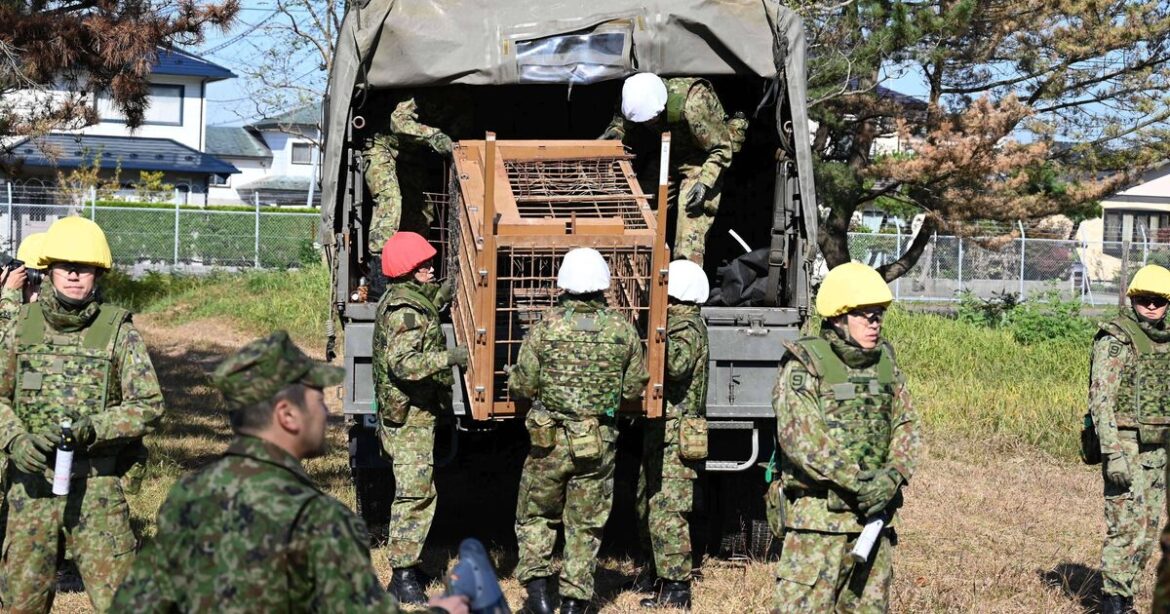The Foreign Office has issued a travel warning for those planning holidays to Japan.
Japan, which is regularly rated one of the safest countries in the world, has deployed troops to help tackle a surge of bear attacks that have left residents in the mountainous region of Akita, in the north, living in fear. Reports of sometimes fatal encounters with brown bears and Asiatic black bears are being reported almost daily as the animals forage for food ahead of hibernation season.
Sightings have been reported near schools, train stations, supermarkets and even a hot springs resort. Since April, over 100 people have been injured and at least 12 killed in bear attacks across Japan, according to Environment Ministry statistics at the end of October.
The UK Foreign Office has now issued a travel warning for UK citizens. It reads: “Bear sightings and attacks have increased in parts of Japan, especially in mountainous and forested areas, including near populated zones. Follow local advice and alerts, and take precautions if travelling in these areas.”
The travel warning urges holidaymakers in Japan to:
research the region to learn about the local wildlifeavoid walking alone in areas where bears have been sightedtake all rubbish with you, including food wastereport any sightings to local authorities
The increasing bear population’s encroachment into residential areas is occurring in a region with a rapidly ageing and declining human population, with few people trained to hunt the animals. The government has estimated the overall bear population at more than 54,000.
The Defence Ministry and Akita prefecture signed an agreement on Wednesday to deploy soldiers who will set box traps with food, transport local hunters and help dispose of dead bears. Officials say the soldiers will not use firearms to cull the bears.
“Every day, bears intrude into residential areas in the region and their impact is expanding,” Deputy Chief Cabinet Secretary Fumitoshi Sato told reporters. “Responses to the bear problem are an urgent matter.”
The operation kicked off in a forested area of Kazuno city, where numerous bear sightings and injuries have been reported. Soldiers donned in white helmets, bulletproof vests, armed with bear spray and net launchers, set up a bear trap near an orchard.
Takahiro Ikeda, an orchard owner, revealed that bears had devoured more than 200 of his ripe apples. “My heart is broken,” he confessed to NHK television. Akita Governor Kenta Suzuki said that local authorities were becoming “desperate” due to a shortage of manpower.
Defence Minister Shinjiro Koizumi stated on Tuesday that the bear mission aims to ensure people’s daily lives are secure, but emphasised that service members’ primary mission is national defence and they cannot provide unlimited support for the bear response. He noted that the Japanese Self-Defense Forces are already understaffed.
He added that the ministry has not received requests from other prefectures for troop assistance over the bear issue.
In Akita prefecture, home to about 880,000 residents, bears have attacked more than 50 people since May, resulting in at least four fatalities, according to the local government. Experts indicate most attacks have occurred in residential areas.
An elderly woman who went mushroom-hunting in the forest was found dead in an apparent attack over the weekend in Yuzawa city. Another older woman in Akita city was killed after encountering a bear while working on a farm in late October. A newspaper delivery man was attacked and injured in Akita city on Tuesday.
On Wednesday, a resident of Akita city was taken aback when she spotted two bears in her garden, perched on a persimmon tree. The woman, who was inside her home at the time, managed to film the bears as they roamed around for approximately 30 minutes. She recounted to a local TV network how the bears seemed to want to enter the room she was in, prompting her to move away from the window.
Abandoned neighbourhoods and farmland boasting persimmon or chestnut trees often lure bears into residential areas. Once these creatures discover food, they tend to return repeatedly, experts warn.
Specialists attribute Japan’s ageing and dwindling population in rural regions as one factor contributing to this escalating issue. They maintain that the bears are not endangered and require culling to regulate their numbers.
Local hunters, too, are growing older and lack experience in bear hunting. Experts suggest that police and other authorities should receive training to become “government hunters” to assist in culling the animals.
Last week, the government established a task force with the aim of formulating an official response to the bear problem by mid-November. Officials are contemplating conducting bear population surveys, utilising communication devices to issue bear warnings, and revising hunting regulations.
The ministry has stated that the absence of preventive measures in the northern regions has resulted in a surge in the bear population.


AloJapan.com